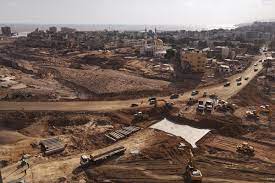
The United Nations Support Mission in Libya warned Monday that an outbreak of diseases in the country’s northeast, where floods have killed over 11,000 people, could create “a second devastating crisis,” with Libyan authorities reporting the spread of diarrhea among over 100 people who drank contaminated water.
In a statement, the United Nations Support Mission in Libya said it was particularly concerned about water contamination and the lack of sanitation after two dams collapsed during Mediterranean storm Daniel sending a wall of water gushing through the eastern city of Derna on Sept.11. Some 11,300 city residents were killed and a further 10,000 people are missing, presumed dead, the country’s Red Crescent said.
The mission said there were nine U.N. agencies in the country responding to the disaster and working on preventing diseases from taking hold that can cause “a second devastating crisis in the area.” It added the World Health Organization sent 28 tons of medical supplies to the devastated country.
Haider al-Saeih, head of Libya’s Center for Combating Diseases, said in televised comments Saturday that at least 150 people suffered diarrhea after drinking contaminated water in Derna. No further updates have been given.
The disaster has brought some rare unity to oil-rich Libya, which has been divided between rival administrations since 2014. Both are backed by international patrons and armed militias whose influence in the country has ballooned since a NATO-backed Arab Spring uprising toppled autocratic ruler Moammar Gadhafi in 2011.
The opposing governments have both deployed humanitarian teams to the port city and other affected areas country but had initially struggled to respond to the crisis. Their efforts have been hampered by poor coordination, difficulty getting aid to the hardest-hit areas, and the destruction of Derna’s infrastructure, including several bridges.
The Health Minister from Libya’s eastern government, Othman Abduljaleel, said Sunday that his ministry had begun a vaccination program “against diseases that usually occur after disasters such as this one.” He didn’t elaborate further.
With rescue efforts still ongoing, the death toll given by Libyan government officials and aid agencies has been varied.
The Red Crescent said last week that at least 11,300 people were killed and 10,000 missing. Late Saturday, The U.N. said in a statement that “more than 9000 people are still missing,” having previously quoted the Red Crescent’s figures. It added the World Health Organization teams are working with Libyan officials to track the dead and missing, confirming that 3,958 bodies have been recovered and identified, and death certificates issued
East Libya’s Health Minister Othman Abduljaleel said at least 3,283 dead bodies were buried as of Sunday night. He didn’t give an exact figure for the bodies retrieved so far. However, previously, on Thursday, he said more than 3,000 bodies were buried “while another 2,000 were still being processed.”
Last week, the Mayor of Derna, who was suspended following the devastation, said the toll could reach 20,000 dead.
Meanwhile, the floods have also raised concerns about the ancient ruins of Ceyrene with UNESCO saying on Monday the ancient Greco-Roman city lies roughly 37 miles east of Derna.





